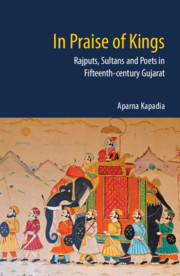Book contents
- Frontmatter
- Contents
- List of Maps
- Acknowledgements
- A Note on Transliteration and Usage
- Map
- Introduction
- 1 Setting the Stage: Contextualising Fifteenth-century Gujarat
- 2 Ranmallachanda: A Warrior Imagined
- 3 Gangadhara's Oeuvre: Cosmopolitan Poetry for Local Kings
- 4 Rājavinoda: The Sultan as Indic King
- 5 Rās Mālā: Re-Discovering a Warrior Past
- Conclusion
- Bibliography
- Index
5 - Rās Mālā: Re-Discovering a Warrior Past
Published online by Cambridge University Press: 20 October 2018
- Frontmatter
- Contents
- List of Maps
- Acknowledgements
- A Note on Transliteration and Usage
- Map
- Introduction
- 1 Setting the Stage: Contextualising Fifteenth-century Gujarat
- 2 Ranmallachanda: A Warrior Imagined
- 3 Gangadhara's Oeuvre: Cosmopolitan Poetry for Local Kings
- 4 Rājavinoda: The Sultan as Indic King
- 5 Rās Mālā: Re-Discovering a Warrior Past
- Conclusion
- Bibliography
- Index
Summary
When, in the late sixteenth century, the Mughals in north India eventually overpowered the regional kingdom of Gujarat, the system of negotiated harmony that had developed between the Muzaffarid sultans and local chieftains was unseated. While the regional sultanate came to an end, the Rajput chieftaincies were subsumed into a new imperial administration. Decades before that, in 1511, Sultan Mahmud Begadahad succumbed to ill health and had been buried at the imperial necropolis of Sarkhej, on the outskins of Ahmadabad, close to the remains of the revered Sufi, Sheikh Ahmad Khattu. During his fiftytwo-year reign, Begada had overpowered the two great forts of Champaner-Pavagadh and Junagadh and integrated the numerous other local chieftains into the regional imperium, both through conquest and through the imposition of a tribute-paying system. By securing the support of spiritual leaders and other diverse communities, both professional and religious, the sultans, particularly Mahmud Begada, had managed to create a regional consensus. The prosperity of the region, ensured by its fertile lands, flourishing seaports, and the revenue system established by Sultan Ahmad and his successors, made these rulers reliable paymasters in the north Indian military marketplace. Over time, the sultans had emerged as important cultural patrons; cities like Ahmadabad and Chamapaner grew as significant centres of sultanate-style architecture and became home to a number of scholars and littérateurs.
Sultanate rule, and its network of relationships with local chieftains, persisted for sixty years after Begada's death. While the Mughal emperor Humayun had defeated the Gujarati sultan Bahadur Shah in c. 1535, it was his son Akbar's conquest of Gujarat in late sixteenth century that made the region an imperial province, or subah; it remained so until the late eighteenth century. And then, as the Marathas became well-ensconced in the region with Mughal decline, the different parts of Gujarat came to be controlled by the Gaekwad family, which had established itself in Baroda beginning in the early decades of the eighteenth century. The Gaekwads conducted repeated and violent revenue extraction incursions in different parts of the region, targeting the chieftaincies of the areas surrounding their kingdoms, such as Mahi Kantha and the Saurashtra/Kathiawad peninsula. These attacks were eventually put to an end when the British annexed Gujarat, along with Kathiawad to the Bombay Presidency in 1808.
- Type
- Chapter
- Information
- In Praise of KingsRajputs, Sultans and Poets in Fifteenth-century Gujarat, pp. 129 - 157Publisher: Cambridge University PressPrint publication year: 2018



